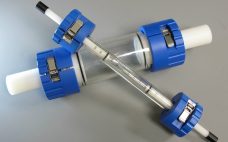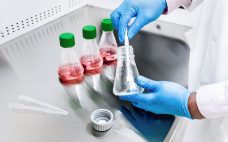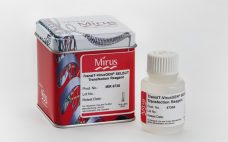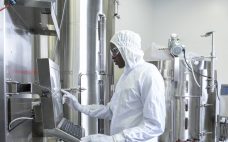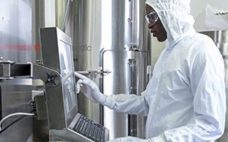Future proof your HCP strategy. Four questions to help you decide if your HCP analysis data is ready for next phase approval. Host cell proteins (HCPs) are a primary source of impurities in biologics development. Scientists must detect and remove HCPs to ensure patient safety and meet regulatory guidelines. If previously undetected HCPs are found in later phases of clinical trials, scientists will need to redesign the drug substance purification strategy – adding financial and time costs that can create…
Author Archives: BPI Contributor
FPLC Column Selection Considerations
This webcast features: Dan Yukon, Head of North American Sales and Global Sales of SNAP Products, Astrea Bioseparations This presentation will outline various selection criteria when considering glass fast protein liquid chromatography (FPLC) columns for low-pressure chromatography. The topics will include: pressure and volume considerations column configuration (aspect ratio) materials of construction frit type, design porosity, and mounting connection types adjustability construction accuracy packing tube design storage. There are many types and brands of columns available on the market, and…
Revealing Cell Secrets with Optical Sensors in Upstream Bioprocessing
This webcast features: Jake Boy, Senior Application Scientist, Scientific Bioprocessing Single-use optical sensors play a critical role in upstream bioprocessing. Scientific Bioprocessing has developed sensors with a form factor suitable for the smallest culture vessels so that data can be obtained from the very early stages of research through scale-up in larger reactors. Our intelligent, dynamic, and real-time monitoring of pH and dissolved oxygen challenges traditional culture protocol assumptions and offers insights into the conditions that cells are actually experiencing.…
Accelerate Cell and Gene Therapy Development and Increase Manufacturing Capacity with Higher Titer LV and AAV Transfection Platforms
This webcast features: Leisha Kopp, Applications Scientist, Mirus Bio Cell and gene therapies show unparalleled promise to improve the human condition by eradicating cancer and rectifying genetic disorders. However, low viral titers and capacity constraints in viral vector manufacturing processes can dramatically hinder the progress of these transformative therapies. The TransIT-VirusGEN® Transfection Reagent from Mirus Bio offers a simplified, cost-effective workflow for recombinant lentivirus (LV) and adenoassociated virus (AAV) generation. TransIT-VirusGEN Transfection Reagent is also effective in both adherent and suspension HEK 293–derived…
Single-Use Technologies: Innovation and Performance
The biotherapeutic market has been rapidly adopting single-use technologies to reduce risk and improve operational efficiencies. For more than 20 years, Thermo Fisher Scientific has pioneered single-use technologies for this industry. Our products have been proven to be robust and scalable from laboratory scale-up to current good manufacturing practice (cGMP) production applications, including single-use bioprocessing equipment, flexible containment, and rigid containment product portfolios. Our webinars will explore data, innovative products, and novel strategies featuring single-use solutions for the bioprocessing market.…
ELEVECTA – The future of AAV gene therapy vector production
Pharmaceutical companies with gene therapies in their pipeline need to establish scalable production processes that can keep up with the increasing demand in terms of volume, quality and robustness, says CEVEC. Gene therapies are seen as one of the most promising approach to treat life-threatening diseases with no therapeutic options and high medical needs. In addition, gene therapies are now advancing also into indications with larger numbers of patients, including Alzheimer’s and Parkinson’s, thereby dramatically increasing the demand for viral…
Advantage of Antibody-Based Selectivity in the Purification of Next-Generation Biologics
The webcast features:Â Laurens Sierkstra, Senior Director, Business Leader Purification, Thermo Fisher Scientific Advances in biotherapeutics are generating an increasing range of complex molecules that present unique and often complex purification challenges. Affinity chromatography can serve as a platform solution for the purification of these challenging molecule modalities. An effective affinity resin can help to simplify biomolecule purification, reduce the number of purification steps, and reduce the overall cost of goods in biotherapeutic manufacturing. By taking advantage of antibody-based selectivity, camelid…
Ask the Expert: Mass Spectrometry for Relative and Absolute Quantitation of Process-Related Impurities
Qualitative and quantitative analyses of process-related impurities are critical to manufacturing a safe, high-quality drug product. During his 17 June 2020 “Ask the Expert” webcast, Steven Broome (BioPharmaSpec) described using mass spectrometry (MS) for such analyses. Focusing on isopropyl-β-D-thiogalactopyranoside (IPTG), kanamycin, and host-cell proteins (HCPs), Broome overviewed best practices for using MS to detect and quantitate low levels of impurities. Broome’s Presentation Chemicals used in biotherapeutic production can be present as impurities in the resulting drug product. These impurities can…
Enabling Increased Performance, Robustness, and Safety in Single-Use Bioreactors
This webcast features: Lara Nascimento-Brooks, Product Manager, Sartorius Stedim Biotech The discussion will focus around three relevant themes for bioprocess development on single-use bioreactors: performance, robustness, and safety. An initial overview of the current landscape developments in the biopharmaceutical industry highlights that bioprocesses should remain flexible enough in order to accommodate intensification and reduce further time-to-market. With this in mind we will discuss key aspects of bioreactor performance improvement in order to achieve that goal. Additionally, processes must remain sufficiently…
Aggressive Microbial Production from Inoculation Through Harvest in Single-Use Systems
This webcast features: Dmitrij Bugajev, R&D Scientist, and Jason D. Brown, Design Engineer, Thermo Fisher Scientific Single-use fermentors enable production facilities to utilize single-use technologies instead of traditional stainless-steel fermentor vessels, achieving equivalent expression with rapidly growing high-density cultures. In this webcast, we will compare some results from various processes with yeast and bacteria before and after technology transferred to single-use at our two facilities. We will give you our feedback as previous end users of stainless-steel fermentors and now…


